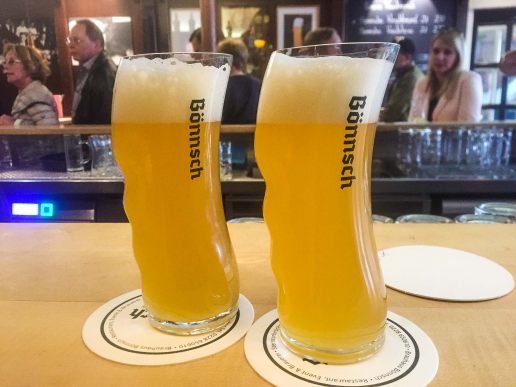[easy-social-share buttons=”facebook,twitter,pinterest,pocket,mail” counters=1 counter_pos=”hidden” total_counter_pos=”leftbig” style=”icon” twitter_user=”@Prostly” point_type=”simple”]
Sitting at Brauhaus Bönnsch in former capital Bonn, under a blue sky of angels floating in the clouds, near old Germans gagging on about Chancellor Merkel and immigrants and VW, made me realize something: if skipping German class was this educational, I’d trade my textbook for a beer any day.
And while I contemplated paying and going and sneaking back to class, I received another round, as I had forgotten to place a coaster on the top of my finished beer, a signal to the bartender that says I’m finished. With a cold beer in hand, I continued listening in on the old Germans providing life lessons I knew I couldn’t find elsewhere. Their conversations drifted from Bundesliga football, women and then again on politics and the economy, before they yelled for another round to the bartender, who served without smile another batch of lightly hopped Bönnsch that seemed to fuel their flow of words as I listened intently. Here and there I picked up parts of their conversation, listening in on nothing private; for if it were, I thought, they wouldn’t share so loudly. But it was my turn to order next, and so I did, as the lads turned their conversation towards the beer maiden, who served with tradition yet another tray of 0.3 liter spirally shaped glasses filled with cloudy, yeasty goodness known in German as hefetrüb.
Noticing that I was drinking one for their every two, I ordered another Bönnsch in an attempt to keep up. Little good it did me, as before I knew it, the men had another fill, seemingly unfazed by the beer’s 4.6% alcohol content. I soon learned at the behest of other patrons that Bönnsch and its cousin Kölsch, brewed in neighboring Köln, should be consumed in three or four swallows, when the beer is cold and frothy and most quenching.

After about three or four or five spirally ones, which I could only guess was their sixth or eighth or twelfth, I stumbled to think of the right German word when called in for a “Prost.” My simple “Cheers” convinced no one that I wasn’t a German and that I had been listening not in interest of their stories, but as a student of the German language, which I assumed was not alright.
“There’s a time and place,” one of the guys said in perfect English, “when ‘aller Anfang ist schwer.’”
Confused, I asked the meaning, which he gave without despair: Every beginning is difficult, as it should be. What’s important, he said, is to keep trying until you get it right, even if you’re shit at the start. But don’t worry, he continued, we say “Cheers” too.
With that, I was invited again to another “Cheers” of the good stuff and gave without hesitation a proper German “Prost.” The men, happy that I learned a thing or two about their culture, said “Tschüss” and exited the bar to enjoy the rest of their Sunday afternoon, when Germans, I was told, like to traditionally gather in pubs to enjoy Frühschoppen, an alcoholic drink or two before midday.
And as I also exited, after one too many beers, I walked home thinking: “alles ist mir egal,” everything is alright, and that skipping class isn’t such a bad thing after all, especially if I can learn a thing or two at a bar.
Sign-up for our Monthly Newsletter
3 Comments
Add comment Cancel reply
This site uses Akismet to reduce spam. Learn how your comment data is processed.


[…] A Beer for Class at Brauhaus Bönnsch in Bonn, Germany […]
Haha. Nice article…. I’ll be checking out this place on my next trip to Bonn, thanks ????
Where can I buy your original beer glasses from Bauhaus Bönnsch (finger grip glasses)
Thank you Agneta